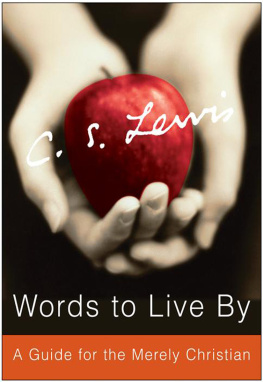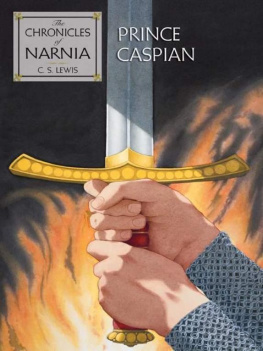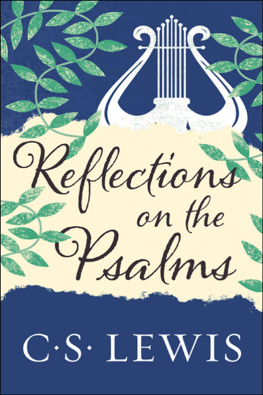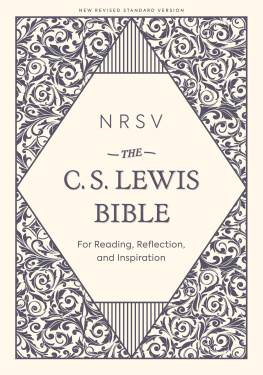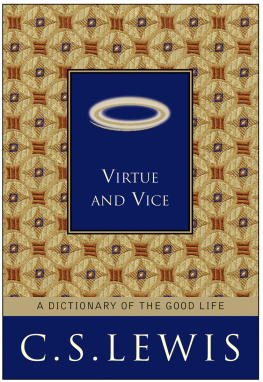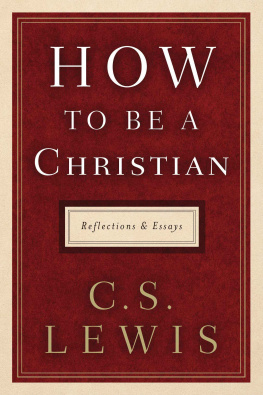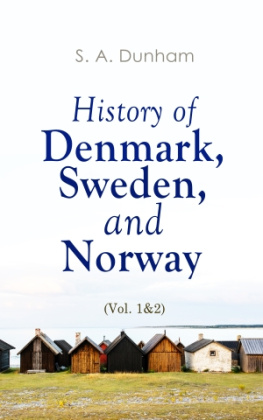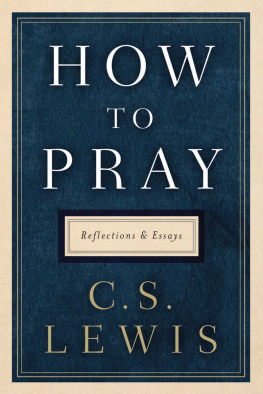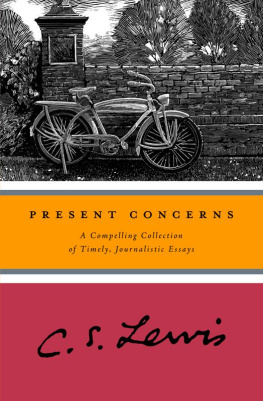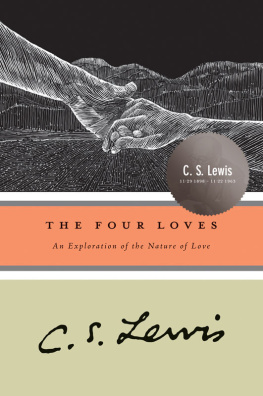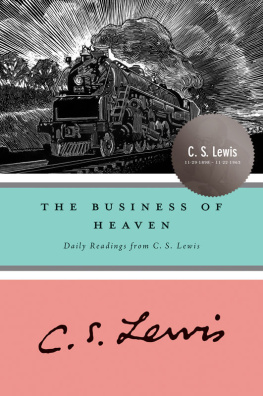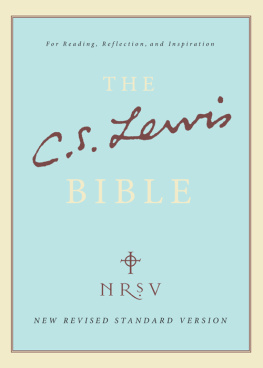Mere Christianity
The Screwtape Letters: Annotated Edition
The Screwtape Letters "(with "Screwtape Proposes a Toast")"
The Great Divorce
The Problem of Pain
Miracles
A Grief Observed
The Abolition of Man
The Weight of Glory
George MacDonald: An Anthology
Pilgrim's Regress
Letters to an American Lady
God in the Dock
Christian Reflections
A Year with C. S. Lewis
"Yours, Jack"
Words to Live By
"The Collected Letters of C. S. Lewis, Volume 1"
"The Collected Letters of C. S. Lewis, Volume 2"
"The Collected Letters of C. S. Lewis, Volume 3"
Studies in Words
Studies in Medieval and Renaissance Literature
Selected Literary Essays
The Discarded Image
Image and Imagination
The Allegory of Love
Also Available from HarperCollins
The Chronicles of Narnia:
The Magician's Nephew
"The Lion, the Witch and the Wardrobe"
The Horse and His Boy
Prince Caspian
The Voyage of the Dawn Treader
The Silver Chair
The Last Battle
The Wisdom of Narnia
A Year with Aslan
Space Trilogy:
Out of the Silent Planet
Perelandra
That Hideous Strength
Words to Live By
A Guide for the Merely Christian
C. S. Lewis
Edited by Paul F. Ford

Contents
We have retained Lewiss spellings and misspellings, abbreviations, and other idiosyncrasies. The principal abbreviations are:
& | and |
C. of E. | Church of England |
cd. | could |
H. | Helen Joy Davidman Lewis |
N.T. | New Testament |
R.C. | Roman Catholic |
shd. | should |
tho | (al)though |
W. | Warren Hamilton Lewis |
wd. | would |
wh. | which |
v. | very |
Xtianity | Christianity |
yr | your |
Some references in Words to Live By are made to Lewiss use of the works of George MacDonald. In some ways, Lewiss George MacDonald: An Anthology is the key to understanding Lewis; no one can know Lewis until this book has been taken on board.
Paul F. Ford
Charitygiving to the pooris an essential part of Christian morality. Some people nowadays say that charity ought to be unnecessary and that instead of giving to the poor we ought to be producing a society in which there were no poor to give to. They may be quite right in saying that we ought to produce that kind of society. But if anyone thinks that, as a consequence, you can stop giving in the meantime, then he has parted company with all Christian morality. I do not believe one can settle how much we ought to give. I am afraid the only safe rule is to give more than we can spare.
Mere Christianity
On the duty of alms-giving, and even on the subtle corruptions of alms-giving, few men have written better than Calvin himself. The limit of giving is to be the limit of our ability to give. We must not consider ourselves free to refuse because those who ask us are undeserving, for Scripture here cometh to our aide with this excellent reason, that we respect not what men merit of themselves but looke only upon Gods image which they bear. We must guard against that subtle insolence which often poisons the gift. Even a merry countenance and courteous wordes accompanying it are not enough. A Christian must not give as though he would binde his brother unto him by the benefit. When I use my hands to heal some other part of my body I lay the body under no obligation to the hands: and since we are all members of one another, we similarly lay no obligation on the poor when we relieve them ( Institutio , III. vii. 6, 7).
English Literature in the Sixteenth Century Excluding Drama
To shrink back from all that can be called Nature into negative spirituality is as if we ran away from horses instead of learning to ride. There is in our present pilgrim condition plenty of room (more room than most of us like) for abstinence and renunciation and mortifying our natural desires. But behind all asceticism the thought should be, Who will trust us with the true wealth if we cannot be trusted even with the wealth that perishes? Who will trust me with a spiritual body if I cannot control even an earthly body? These small and perishable bodies we now have were given to us as ponies are given to schoolboys. We must learn to manage: not that we may some day be free of horses altogether but that some day we may ride bare-back, confident and rejoicing, those greater mounts, those winged, shining and world-shaking horses which perhaps even now expect us with impatience, pawing and snorting in the Kings stables. Not that the gallop would be of any value unless it were a gallop with the King; but how elsesince He has retained His own chargershould we accompany Him?
Miracles
Because God created the Naturalinvented it out of His love and artistryit demands our reverence; because it is only a creature and not He, it is, from another point of view, of little account. And still more, because Nature, and especially human nature, is fallen it must be corrected and the evil within it must be mortified. But its essence is good; correction is something quite different from Manichaean repudiation or Stoic superiority. Hence, in all true Christian asceticism, that respect for the thing rejected which, I think, we never find in pagan asceticism. Marriage is good, though not for me; wine is good, though I must not drink it; feasts are good, though today we fast.
The wrong asceticism torments the self: the right kind kills the selfness. We must die daily: but it is better to love the self than to love nothing, and to pity the self than to pity no one.
God in the Dock
Sorry youre in a trough. Im just emerging (at least I hope I am) from a long one myself. As for the difficulty of believing it is a trough, one wants to be careful about the word believing. We too often mean by it having confidence or assurance as a psychological stateas we have about the existence of furniture. But that comes and goes and by no means always accompanies intellectual assent, e.g., in learning to swim you believe, and even know intellectually that water will support you long before you feel any real confidence in the fact. I suppose the perfection of faith wd. make this confidence invariably proportionate to the assent.
In the meantime, as one has learnt to swim only by acting on the assent in the teeth of all instinctive conviction, so we shall proceed to faith only by acting as if we had it. Adapting a passage in the Imitation one can say What would I do now if I had a full assurance that there was only a temporary trough and having got the answer, go and do it. I a man, therefore lazy: you a woman, therefore probably a fidget. So it may be good advice to you (though it wd. be bad to me) not even to try to do in the trough all you can do on the peak.
The Collected Letters of C. S. Lewis, Volume II
My primary field is the past. I travel with my back to the engine, and that makes it difficult when you try to steer. The world might stop in ten minutes; meanwhile, we are to go on doing our duty. The great thing is to be found at ones post as a child of God, living each day as though it were our last, but planning as though our world might last a hundred years.

